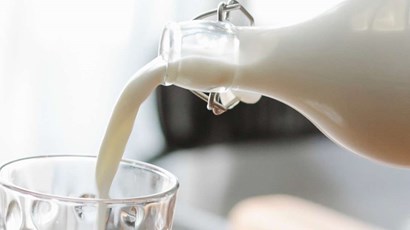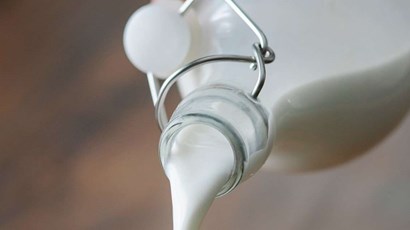What can you eat if you're lactose intolerant?

Is it cow's milk allergy or lactose intolerance?
The supermarket chiller aisles are bursting with lactose-free and dairy milk substitutes these days. There's never been more choice for what to put on your cornflakes. But many people confuse the terms 'lactose intolerance' and 'cow's milk allergy'. So what's the difference?
Allergy or intolerance?
An allergy is when the immune system overreacts to a particular food, in this case, cow's milk. Because the immune system is affected, it can cause a wide range of symptoms that can occur in a number of different parts of the body.
But an intolerance is different to an allergy. It simply means that the body cannot deal with something that has been eaten (in this case lactose - the sugar found in milk) in some way. Usually an intolerance only causes symptoms within the gut, such as bloating and diarrhoea.
How to cope with a nut allergy at Christmas
Around two in 100 children and one in 200 adults have a nut allergy in the UK. Nuts are a staple...
Cow's milk protein allergy
Cow's milk protein allergy (CMPA) is the most common food allergy in children. It affects around 5% of children under three. Most grow out of the condition by the time they attend school, and 50% by the time they are a year old. A true allergy to cow's milk is quite rare in older children and adults.
If your baby or child appears to be developing symptoms after drinking cow's milk, it is far more likely that they have CMPA than lactose intolerance. Symptoms may happen rapidly in some children (immediate reactions) or can take hours or even days to develop (delayed reactions).
Immediate reactions are quite easy to identify as they develop soon after cow's milk has been consumed. If your child develops rashes, sneezing, running eyes, hives or vomiting soon after drinking cow's milk, this can suggest an allergy. Formula milk is made from cow's milk, and your baby can react to cow's milk from your breast milk if you eat or drink any dairy products while breastfeeding. This means an allergy to cow's milk can occur both in formula and breastfed babies.
Emergencies
If you or your child ever have a rapid reaction that causes lip swelling or breathing problems, this is a medical emergency and needs urgent treatment. Call 999.
Immediate allergic reactions to cow's milk, such as hives or running eyes are know as IGE mediated reactions. This type of reaction is far less common than delayed reactions to cows milk (non IgE).
Delayed (non IGE) reactions can be harder to pick up because they can take hours or even days to develop after drinking cow's milk - especially for babies, who drink milk several times a day. Symptoms to look for in your child can include skin problems (such as eczema), acid reflux, vomiting or diarrhoea.
Babies or children with CMPA may also suffer from poor weight gain or struggle to feed. They are also often described as 'fussy' babies.
Lactose intolerance
Lactose intolerance happens when your body can't break down the sugar found in milk properly. This causes mainly gut symptoms such as diarrhoea, bloating and cramps. It is actually extremely rare for a baby to be born with a lactose intolerance, although some may develop it after a vomiting or diarrhoeal illness.
Does my child have a cow's milk allergy?
If you are concerned your child is reacting to cow's milk or another food, it is important to make sure you see a doctor. In the meantime, keeping a food diary for your child if they are weaned can prove very useful.
If you are breastfeeding your baby, it is still possible for them to react to cow's milk through your milk. So if you are breastfeeding and concerned your child is having a reaction, please see your doctor to discuss things further.
Managing the condition
Once CMPA or lactose intolerance has been diagnosed, you may be offered advice on how to manage the condition. This may include tips from a dietician on alternatives to cow's milk formulas and how to avoid it in processed foods. You may also need advice on avoiding foods that contain cow's milk in your own diet if you are breastfeeding.
Cow's milk allergy
The best way to manage cow's milk protein allergy is to completely remove all dairy products from your baby or child's feed. (or your own if you are breastfeeding) .Please seek advice from a healthcare professional before making large changes to your own or your child's diet. It's worth reading the cow's milk allergy information on Allergy UK too.
Most milk substitutes from the supermarket are not suitable for children under the age of 2 years, so non-breastfed babies would need a specialist formula. These formulas can be made avaiable from your GP, and form two main groups. Hydrolysed formulas are made by breaking the protein in cow's milk protein down into smaller pieces, making it less likely to cause an allergic reaction. This is the standard treatment for infants with cow's milk allergy in the UK. For children who are more severely allergic, amino acid formulas which are broken down even further, making them less likely to cause a reaction, can be used. Soya milk formulas are not generally advised for very young children with CMPA.
Certain milk alternatives (for example, rice milk) should be avoided in older children as well (up to the age of 5 years) so please ask your doctor or dietician for guidance. There are many dairy-free alternative milks available now, including soya, coconut, and almond milks. Most of these products are available in forms that are fortified with calcium and vitamins to make them nutritionally more similar to cow's milk.
Lactose intolerance
Today, lactose-free milk and other dairy products are available in most major supermarkets. This is great for those with lactose intolerance, as there are fewer dietary restrictions than there used to be.
Currently there is a potential treatment for lactose intolerance undergoing clinical trials. The medication is called RP-G28 and could potentially reverse the condition, meaning that foods containing lactose would no longer need to be avoided by those with an intolerance. The research looks promising but far more research is needed before such a medication will be available in the pharmacy.






